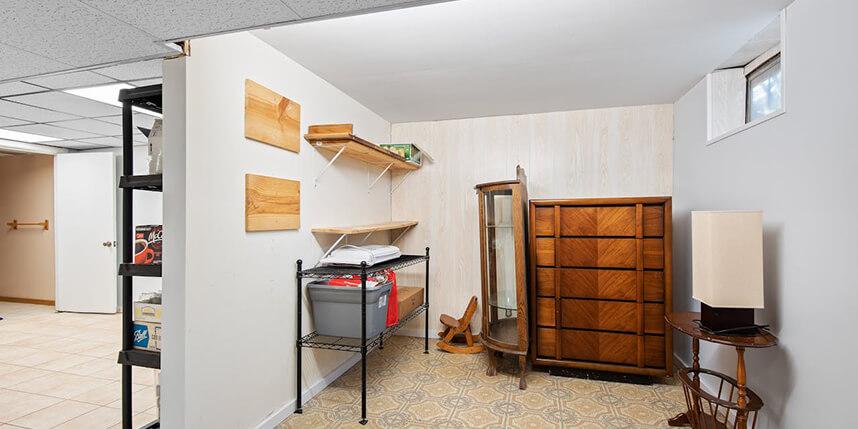Basements: An Investment or a Liability When Selling?
26 Dec 2024
When preparing to sell your home, every feature is scrutinized for its potential to attract buyers and boost property value. Among these features, basements often stand out as a wildcard. While some see them as valuable extensions of living space, others view them as a source of maintenance headaches.
The question remains: are basements an investment or a liability when selling a home? The answer lies in understanding how this often-overlooked space can influence buyer perceptions and your bottom line.
The Many Uses of a Finished Basement
Basements, particularly finished ones, have the potential to add substantial value to a home. They serve as versatile spaces that can be tailored to various needs, from a family entertainment room to a home office or even a guest suite.
In today’s market, where remote work and multifunctional living spaces have become essential, a finished basement can be a significant selling point.
A well-maintained basement can expand usable square footage, which directly impacts property appraisals. For instance, if the basement is counted as livable space due to proper insulation, lighting, and egress windows, it can increase the home's market value.
However, the value-added benefits hinge on the quality of the basement. A space with adequate waterproofing, modern finishes and no signs of mould or mildew will be far more appealing than an outdated or musty one.
When Basements Become a Liability
While basements offer considerable potential, they can also pose risks. Issues like water damage, structural cracks, or inadequate ventilation can turn a basement from a selling point into a deal-breaker.
Buyers are more informed than ever and often come armed with inspectors who will quickly flag any concerns. Even a hint of moisture or the smell of mildew can cast doubt on the overall integrity of the property.
For sellers, the financial implications of basement repairs can be daunting. Fixing drainage issues, replacing sump pumps, or addressing foundation cracks can cost thousands of dollars.
In cases where these issues persist, the basement becomes less of an asset and more of a liability. Additionally, an unfinished or poorly maintained basement might be perceived as wasted potential, prompting buyers to negotiate for a lower price.
Market Trends and Regional Considerations
The perception of basements also varies depending on regional trends and market demands. In areas prone to flooding, for example, buyers might approach basements with caution, even if the space appears well-kept. Conversely, in colder climates, basements are often seen as valuable, cozy retreats that add to the home’s charm and functionality.
Home sellers collaborating with Fair Sale Homes gain a strategic advantage in navigating these complexities. They specialize in assessing properties holistically, considering unique features like basements without the emotional bias that can influence traditional buyers. If your basement presents significant challenges, partnering with these professionals can save you the time and expense of extensive renovations.
Maximizing Your Basement’s Potential
If you’re committed to making your basement an asset, a few strategic upgrades can make a world of difference. Start by addressing the basics: ensure the space is dry, well-lit, and free of odors. Waterproofing measures, such as installing a sump pump or sealing foundation cracks, are non-negotiable for inspiring buyer confidence.
Once the essentials are covered, consider enhancements that align with buyer preferences. Simple cosmetic updates, such as fresh paint, new flooring, or modern light fixtures, can transform a drab basement into an inviting space.
If your budget allows, creating distinct zones a home theater, a gym, or a playroom can showcase the basement’s potential and make it a standout feature of your home.
However, it’s essential to strike a balance between investment and returns. Spending excessively on high-end finishes may not yield a proportional increase in your home’s sale price, especially if the upgrades don’t align with market expectations.
Weighing the Investment vs. Liability Equation
At the heart of the debate lies the question of cost versus reward. Transforming a basement into a selling point requires time, money, and effort. For some homeowners, the expense of repairs and upgrades may outweigh the potential increase in sale price.
In such cases, transparency with buyers can be a more practical approach. Disclosing any known issues and pricing the home accordingly might attract buyers willing to undertake improvements themselves.
On the other hand, if your basement is already in good condition or requires minimal updates, the investment can pay off handsomely. A polished, functional basement adds to your home’s livable square footage and enhances its overall appeal, making it a worthwhile asset in competitive markets.
The Final Verdict
Whether a basement is an investment or a liability ultimately depends on its condition, the local real estate market, and the buyer’s perspective. Sellers who take the time to evaluate their basement’s strengths and weaknesses are better positioned to make informed decisions. By addressing key concerns and presenting the space in its best light, you can turn even a problematic basement into a valuable selling point.
In the end, understanding your audience and tailoring your approach can help you maximize your returns. Whether it’s through targeted upgrades or selling to buyers who appreciate the home’s potential as-is, your basement can tip the scales in your favor when it comes to closing the deal.
Categorised in: All News












